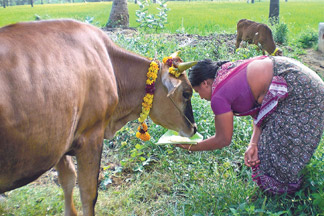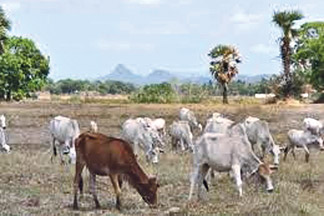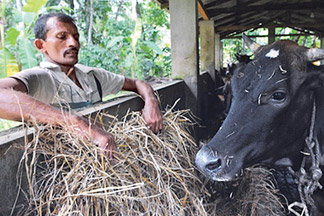Eastern Province to boost livestock industry growth
By Dhaneshi YATAWARA
Being marginalised nearly for the past three decades due to threats
of terrorism, most of the farmers of the East were adopting a survival
strategy 'Invest less and hope for the best'. The affected livestock
industry would have been the second worst devastated field in the
Eastern Province apart from agriculture.
 Throughout the history, the country's largest herds of cattle and
buffaloes were reported from the dry and dry intermediate zones. The dry
zone covers the Eastern and the North Central provinces. The Eastern
Province covering Trincomalee, Batticaloa and Ampara Districts has a
huge potential for development of dairy industry. Goat production is a
traditional form of livestock production among farmers especially in the
dry zone. About 75 p.c. of goat population is located in the dry and
intermediate zones in Sri Lanka and is practised as an extensive
production system. Goat milk is becoming popular for its health benefits
and, rearing dairy goats under intensive management is therefore getting
popular in recent times. Throughout the history, the country's largest herds of cattle and
buffaloes were reported from the dry and dry intermediate zones. The dry
zone covers the Eastern and the North Central provinces. The Eastern
Province covering Trincomalee, Batticaloa and Ampara Districts has a
huge potential for development of dairy industry. Goat production is a
traditional form of livestock production among farmers especially in the
dry zone. About 75 p.c. of goat population is located in the dry and
intermediate zones in Sri Lanka and is practised as an extensive
production system. Goat milk is becoming popular for its health benefits
and, rearing dairy goats under intensive management is therefore getting
popular in recent times.
During the conflict, the dairy industry which had been flourishing in
the region was seriously affected as other economic sectors. Livestock
has long been a major component of the economy of the Eastern Province.
This potential growth sector has been recognised as a key sector playing
a vital role in poverty alleviation, improving nutritional status of the
populace, mitigating urban-rural gaps, resolving gender issues by more
work opportunities for women, improvement of soil fertility and
contributing to the GDP of the province. Livestock sector is regarded by
the Government as a priority sector in its development program.
This year the Government through the 'Divi Neguma' program of the
Economic Development Ministry allocates Rs. 1,117 million to promote
livestock and fisheries sectors of the country, according to the Rural
Economic Development Division of the Ministry. With peace returning to
the East, the livestock industry re-entered the villages with backyard
poultry introduced through the 'Divi Neguma' Program. Today the
Government's plan is to develop livestock sector of the Eastern Province
into a Small and Medium Scale Enterprise.
According to the Ministry of Livestock and Rural Community
Development, there are 19 veterinary offices in Ampara district, 14 in
Batticaloa and 11 in Trincomalee. Statistics provided by the Eastern
Provincial Council states that the Province has around 30 percent of the
national cattle and buffalo population. The availability of natural
grasslands, rice fallows and possibility of getting feed ingredients
such as maize, rice bran, and various crop micro products and an active
labour force provide a favourable resource-base for livestock
development in the province.
 A fascinating rise in milk production and cash incomes are now
evident to position Eastern Province as the second best province next
only to the Central Province, for fresh milk production in the island.
The opening of the milk markets, collection routes, transport, free land
for grazing along with the herding of lost and abandoned cattle are of
significance to enhance the dairy value chain in the Eastern Province. A fascinating rise in milk production and cash incomes are now
evident to position Eastern Province as the second best province next
only to the Central Province, for fresh milk production in the island.
The opening of the milk markets, collection routes, transport, free land
for grazing along with the herding of lost and abandoned cattle are of
significance to enhance the dairy value chain in the Eastern Province.
The government policy on dairy development is aimed at producing 50
p.c. of the country's requirement of milk by the year 2015. Priority is
therefore given for the dairy development in public sector investment
programs and several incentives offered to the private sector to engage
in dairy sector. As per the currently available statistics, the domestic
milk production only constitutes about 17 percent of the requirement and
the rest is imported. On an average the import bill on dairy commodities
had been around 15 billion rupees. The government attention is mostly
focused on the dairy sub sector to develop this sector into a 'local
industry'.
Limited access to grazing lands, lack of grazing during both wet and
dry seasons, shortage of drinking water during the dry period and
prevailing competition with other socio economic activities for land and
water, together with environmental concerns demand more sustainable
smaller but efficient dairy herd operations. Transparency is the biggest
problem in milk marketing in Sri Lanka and farmers have all the rights
to know the criteria, technical standards on which milk payments are
being made at milk bulking centres. In most areas milk is collected once
a day - mostly in the morning. Absence of proper cool chain maintaining
system spoils the milk if kept overnight. Depending on the climatic
conditions and regional weather, the milk collection fluctuates rapidly.
Completed in mid 2012, a Dairy Enhancement Program coordinated
through the Economic Development Ministry was targeting the development
of the livestock sector in the Eastern Province.
"Though the project is completed the established network of farmers
will be continued and expanded with the new developments taking place in
the Eastern Province under the Divi Neguma Program," said Sagarika
Sumanasekara, Veterinary Surgeon attached to the Rural Economy
Development Division of the Ministry who was mainly in charge of
coordinating the Dairy Enhancement Program from the Ministry.
 The project was implemented in close coordination with Vet Surgeons
and Livestock Development Instructors working in the divisional level
attached to the Ministry of Livestock Development. The project was implemented in close coordination with Vet Surgeons
and Livestock Development Instructors working in the divisional level
attached to the Ministry of Livestock Development.
The Provincial Ministries of Agriculture, Animal Production and
Health are responsible for the local implementation of livestock
development projects.
The project developed nearly 3,000 small scale dairy farmers. Nearly
half of them were women. Farmers are given a thorough training on dairy
industry and they are formed into milk producer groups.
Farmers were given technical training to convert existing traditional
dairy management practices with new concepts and technologies to enhance
their dairy production which is designed to help farmers improve their
income. They are linked to the veterinaries of the Department of Animal
Production and Health.
Medium scale milk collection centres were constructed, each receiving
milk from these producer groups. This provides opportunities for
extension services, feed inputs and pharmacy stores and training
facilities for participating farmers. Milk collection centres are owned
and operated by the milk producing groups.
This comprehensive approach ensured the traditional farmer in the
dairy industry that the sustainability of these efforts towards economic
development and empowering the farmers improve their incomes and better
provide for their families.
In addition, the new Divi Neguma program plans to incorporate nearly
500 farmers into the industry from the Eastern Province. Recently the
Uppuweli farm of the Department of Animal Production and Health received
a state-of-the-art poultry hatchery at a cost of Rs. five million.
This was with the intention of promoting backyard poultry under the
Divi Neguma program.
The five-year development plan under the Eastern Provincial Council
envisages an annual growth rate of 10 percent in the livestock sector.
To achieve this target, three main thrust areas are identified - i.e.,
enhancing production and productivity of livestock, promoting farmer
empowerment and skills development and improving livestock marketing and
value addition. The development program includes increasing supply of
breeding stock such as cross bred heifer calves (cattle) and goats, day
old broiler and layer chicks as well as promoting back yard
poultry-keeping.
It also has prioritised the need to increase availability of animal
feed, improving veterinary services, promoting collective action among
livestock farmers, strengthening entrepreneurial skills of stakeholders.
Improving livestock marketing and promoting, processing and value
addition of livestock products.
The labour intensive nature of many livestock operations, under Sri
Lanka conditions, can therefore be effectively harnessed for rural
employment creation, livelihood improvement and poverty alleviation
initiatives. Government plans to facilitate the transformation of the
present subsistence level of dairy production into a viable commercially
oriented activity. Developing the livestock sector is a necessary
condition for ensuring the food security in the country. |

